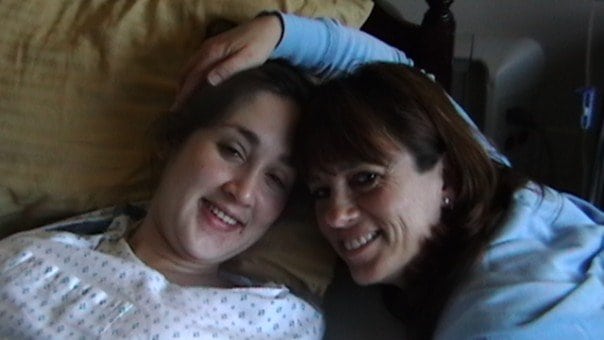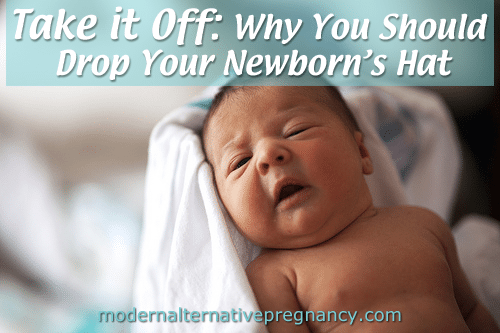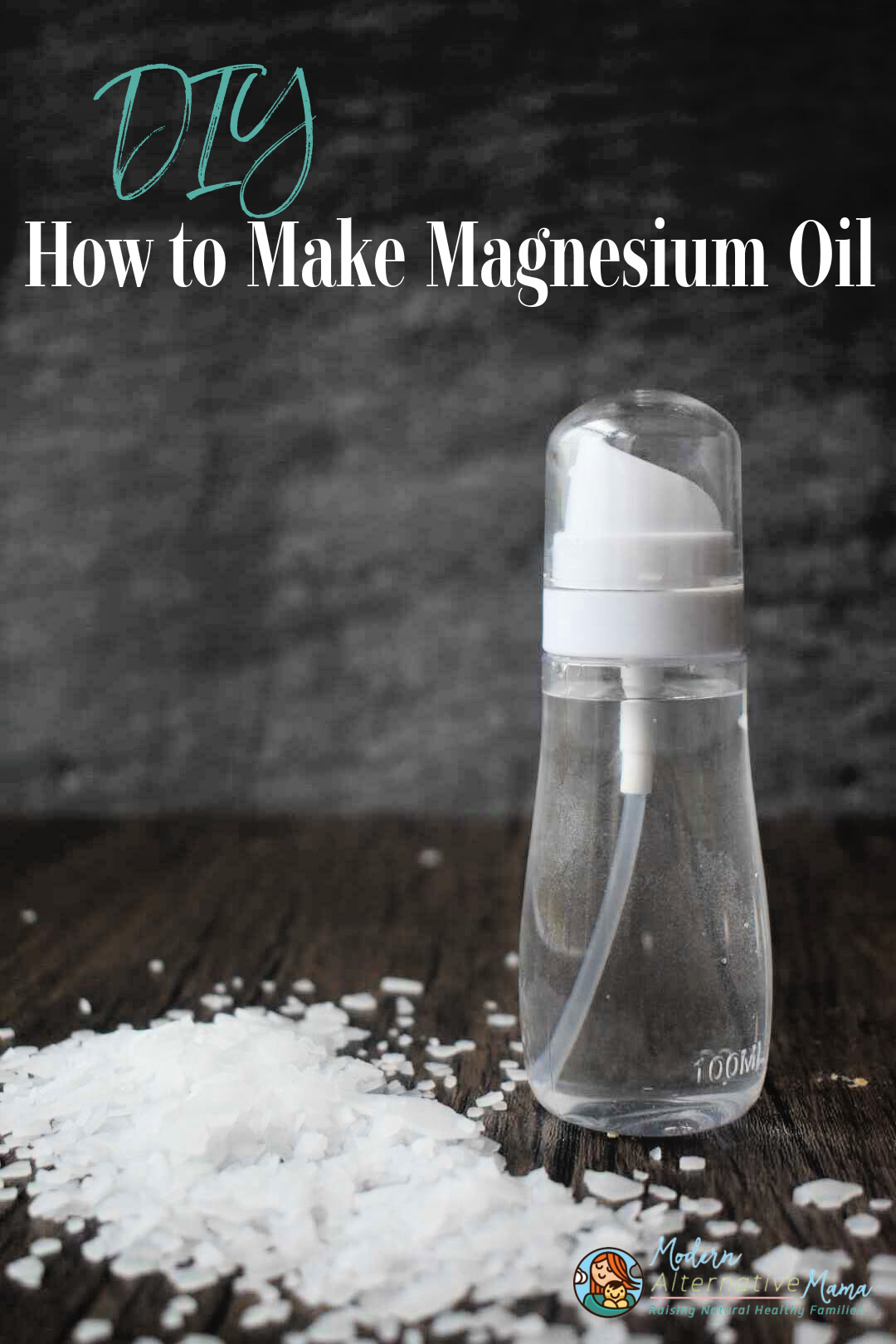Pregnancy can affect the body in many ways. Many are expected, while some are more complicated. Pregnancy-induced eczema is not very common but can be difficult to deal with. We have tips to help soothe the itch and provide relief.
Editor’s Note: This is a guest post from Diana at Saving by Making.
Eczema, which someone has dubbed “the itch that rashes,” is terrible. The itch-scratch cycle seems never ending, it can interrupt sleep, scratching leads to broken skin which is more prone to infection, and it looks horrendous.
If you’re pregnant and are dealing with eczema for the first time, please know I completely sympathize with you! I’m currently pregnant with little #2, and I’ve been unfortunate enough to experience moderate to severe pregnancy-induced eczema both times.
I don’t have any answers about what is causing my flare-ups, but I do have a whole arsenal of tricks that sometimes help to soothe the itch, heal the skin, provide some relief, and prevent serious skin damage.
Pregnancy-induced eczema (“atopic eruption of pregnancy“) is common enough that there is some online information, but uncommon enough that I don’t know anyone else personally who has struggled with it. I would love, love it if you would share any tips or tricks you have found to help keep yours under control. Or if you’ve found another cause besides crazy pregnancy hormones, please share that too. Most forums are filled with “Help! I itch. I don’t want to use steroids,” but rarely does anyone provide answers.
What is Eczema?
Before I list the things I’ve tried that work for me (sometimes), I want to mention causes for eczema. Eczema is not like the flu, where you know (approximately) which virus is causing your fever and chills. It’s not like a common cold where some nasty germ multiplied and filled your head with mucus. It’s not like a broken bone where you can fix it and you’re good as new. Eczema is as individual as the person who has it, and it can be a long and involved process to find out exactly what your triggers are and eliminate them.
Types of Eczema
Some people have contact dermatitis–soaps, fragrances, synthetic fabrics, dyes, dust, or other things irritate the skin when contact is made. Others have atopic dermatitis–something irritates your skin, but it’s not as easy as changing laundry detergents or using unscented soap. People with atopic dermatitis may have a sensitivity to a food, an environmental allergen, or a change in the weather; or perhaps the crazy hormones of pregnancy just cause their skin to rebel and retaliate with inflammation and itching.
Causes
Seeing a regular doctor is not likely to help you much as far as curing your eczema. I’ve never had a doctor do anything more than say, “Oh, yep, you’ve got eczema. Here’s a steroid. See ya!” If you’re interested in more than treating the surface symptoms, you’ll have to start doing your own research and making notes of things that work for you.
If you’ve done much reading about auto-immune disorders, healthy eating, a natural lifestyle, food sensitivities, or allergies, you’ve probably come across many, many people linking certain foods to skin issues (often gluten; sometimes dairy, tomatoes, citrus, or any number of less-common offenders). Food very well may be the culprit in most cases of eczema. (If my child was prone to eczema rashes, I would immediately cut out gluten and dairy and see what happened.)
For pregnancy-induced eczema, though, it seems like food intolerances are less likely–if dairy didn’t bother you before pregnancy, why should it bother you during pregnancy? (That’s my current thought; if you know differently, please share!)
Help for Pregnancy-Induced Eczema
If you can’t figure out a cause for pregnancy-induced eczema, you’ll have to do your best to manage your symptoms. It’s best if you can manage them without steroid creams or pills–those have many detrimental side effects and should not be used long-term. Most of them should not be used in pregnancy at all.
Avoiding Irritants
- It’s worth a try to see if laundry soap, bath soap, lotion, a cleaner, or a food is causing your eczema.
- Even if you’re pretty sure that an irritant isn’t the sole cause of your eczema, one of those may be exacerbating it and you may get partial relief from a change of soap or diet.
Curbing the Itch
- Rub: instead of scratching, try deeply massaging the itchy area with your fingertips. Sometimes the pressure is enough to soothe the itch.
- Use a washcloth: if rubbing isn’t quite enough, try using a rough washcloth for scratching–you’ll get some relief, but you won’t break the skin.
- Wet pajamas (or gloves, if it’s your hands): dampen a pair of cotton pajama pants and wring out completely. Put a second pair of pants on top. The cool wetness can help calm the itch and inflammation and lock in some moisture to your skin. Sounds terrible but it feels like a dream if your itching is severe!
- Peppermint essential oil: the cooling, chilling effects of peppermint oil are amazing for taking away the itchy sensation! Make sure to apply coconut or olive oil liberally first, and then spread a drop of the oil over as wide an area as you can. This will dilute the peppermint oil which is better for you and your skin. Don’t use on severely broken skin–it will sting. And be careful in your third trimester or while nursing since peppermint can decrease milk supply. (And you should probably check with your doc too.)
- Baking soda bath: soak in a bath with a few scoops of baking soda thrown in. Moisturize as soon as possible after the bath.
- Oatmeal bath: I’ve never tried this, but some people find relief from the Aveeno oatmeal baths.
- Coconut oil: a light moisturizer that’s unlikely to sting but does provide some itch relief. It may also help prevent infection in broken skin.
- Smooth fabrics: fleece or flannel blankets, pajamas, or sheets can be painful to irritated skin. Look for 100% cotton, woven (not knit like a t-shirt) pajamas and sheets–the smoothness will be less abrasive.
- Socks: if your legs are affected, wearing knee socks can keep your clothes from accidentally setting off an itch-fest. Again, look for 100% cotton socks, and choose ones that are fairly loose and won’t bind tightly around your knees. Tights or hose also work well sometimes. Long sleeves or gloves may help if your arms or hands are itchiest.
- Sunshine: the sun can actually go a long way in helping to curb itching and heal skin. Don’t stay out so long you get burned, but long enough that you’d get a very light tan. Unfortunately, this only works well in the summer when the sun is very direct. I’m anxiously awaiting summer this year–it was the only thing that really helped in my first pregnancy!
Rebuilding Your Skin
When you scratch an area of skin repeatedly, the lipid barrier can be broken down so that your skin can’t hold in the moisture it needs. This leads to dry skin, which leads to more itching, and you already know the end of that story! (By the way, that link is to a fascinating article about skin and eczema. I’m not endorsing it 100% but it definitely presents some interesting points.)
There are a few things you can do to help rebuild healthy skin. These things don’t really remove the itching sensation, but they do help your skin stay intact when you end up scratching.
- Drink enough water: water is important for healthy skin, but too much can be a bad thing. Water doesn’t directly hydrate your skin, either–dry skin is not necessarily a sign you’re dehydrated. Drink an amount that keeps you well hydrated (some recommend half your body weight in ounces; you may need more during pregnancy) and then move on to other moisturizing efforts.
- Moisturize: since the skin’s lipid barrier may be damaged (which lets its natural moisture escape), using a gentle, natural moisturizer can really help keep your skin soft and non-itchy. Most commercial lotions include some form of alcohol, and those are likely to sting like fire when applied to broken skin. (If that happens, wash off with soap and water immediately–don’t think you’ll just wait it out!) Homemade lotions are easy to make, or you can buy their equivalents if you’re not into DIY–look for ones that include pure oils (olive, coconut, etc.), shea butter, beeswax, and no preservatives.
- Pumpkin seed oil: although controversial among some because of the type of fats pumpkin seeds contain (a high concentration of omega-6 fatty acids, which can contribute to inflammation and which most people already eat plenty of), supplementing with pumpkin seed oil may help your skin rebuild its natural lipid barrier. You’ll have to do your own research and make your own decision if this is something you’d like to try. For non-pregnant women, borage oil or flaxseed oil can provide similar benefits. Please check with your doctor before beginning a supplement.
- Low shower time: hot water will dry your skin out like nothing else. Consider taking warm, short showers. Always moisturize immediately afterwards before your skin has a chance to dry out.
- Use an electric razor: this will help you achieve shorter showers, and you’ll also get to avoid soap which can be drying and irritating.
Medicine
- Supplementing with Vitamin D has been beneficial in some cases. (Ask your doctor–Vitamin D is something you don’t want to overdose on!)
- If the benefits outweigh the risks (i.e., the rash is reeeeeealllly bad), you may decide to use some type of steroid cream to help jump-start the healing process. Do not do this without consulting your doctor–steroids and pregnancy really should not go together.
- Stretch the cortisone by moisturizing with coconut oil or other natural lotion first–you’ll use less of the cortisone.
- Use the smallest amount possible.
- Try not to use it too many days in a row. As your skin heals, try itch relief to let the healing process continue rather than a continued steroid boost.
- Do everything you can to keep the itching and scratching under control to let your skin heal itself.
As you can see, pregnancy-induced eczema can be overwhelming, especially when it’s your first time encountering it. Best wishes to all you pregnant mamas out there, and especially those who are trying so hard not to scratch anymore!






